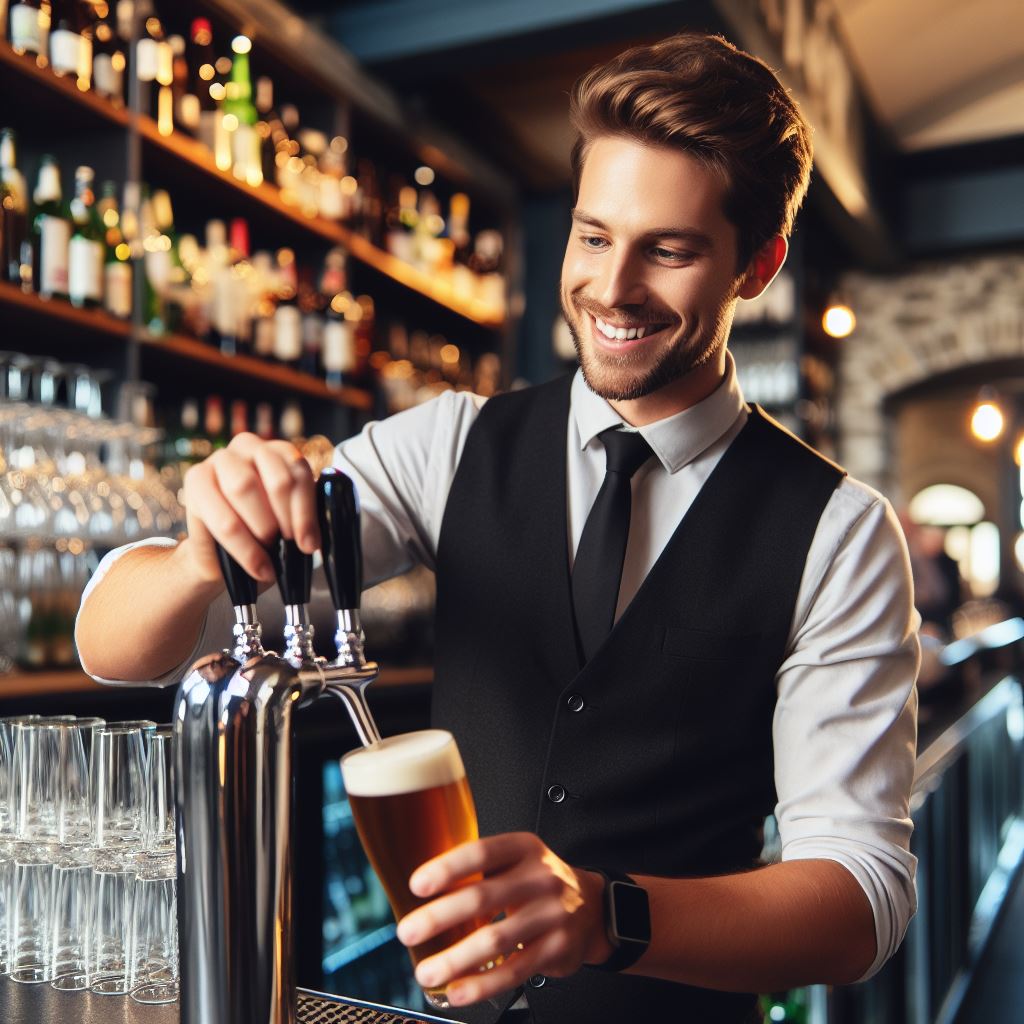The Evolution of UK Pub Culture and Bartending
Last Updated on December 14, 2023
Introduction
The UK pub culture holds a rich history that has evolved significantly over the years.
From its humble beginnings as a gathering place for locals to the modern-day establishment it has become, the pub culture has experienced numerous changes, influencing bartending practices along the way.
Exploring the evolution of UK pub culture and bartending is crucial to understand not only the historical significance but also the current relevance of this topic.
Pubs have long been at the heart of British social life, serving as a meeting point for friends, a place to unwind after work, and a venue for communal celebrations.
The role of bartending within this culture is essential, as it has adapted to meet the changing tastes and preferences of the patrons.
Additionally, the evolution of the UK pub culture and bartending reflects broader societal changes. As the economy and social dynamics shifted, so did the pub scene.
New trends, such as craft beer and cocktail culture, emerged, reshaping the landscape of traditional pubs.
By examining this evolution, we gain insights into the changing lifestyle and values of the UK population.
Moreover, exploring the history of UK pub culture and bartending allows us to appreciate the importance of preserving this cultural heritage.
Pubs are not only places to enjoy a drink but also serve as community hubs, contributing to the social fabric of neighborhoods.
Understanding the evolution of pub culture helps us recognize the significance of these institutions and the role they continue to play in society.
In short, the evolution of UK pub culture and bartending is a fascinating topic that offers insights into both historical and contemporary society.
By delving into this subject, we can appreciate the importance of pubs and the bartending profession, as well as understand the broader social changes that have shaped them.
Historical Background of UK Pub Culture
Origins of British Pub Culture
- The British pub culture traces its roots back to Roman taverns during their occupation.
- These early taverns served as meeting places for soldiers and travelers.
- As the Roman Empire declined, monasteries became crucial to preserving beer-making traditions.
- Monks brewed beer as a way to financially support their religious orders.
- During the medieval period, alehouses, which were primitive pubs, emerged throughout the UK.
- Alehouses primarily served beer, which was considered a safer alternative to drinking water due to sanitation issues.
- By the 16th century, pubs as we know them today began to take shape.
Role and Significance of Pubs in UK Society
- Pubs have long been at the heart of British social life, serving as essential meeting places.
- They provide a communal space where people gather to socialize, relax, and share experiences.
- Pubs act as a public living room, fostering a sense of belonging and community.
- Historically, pubs were often attached to inns, providing accommodation for travelers.
- The local pub serves as an extension of people’s homes, offering a familiar and friendly environment.
- Pubs have also played a crucial role in political and social movements, serving as meeting places for activists.
Historical Events and Developments Shaping Pub Culture
- The Beer Act of 1830 led to an explosion of pubs, making them more accessible to the working class.
- During World War I, pubs became important gathering places, providing solace during difficult times.
- The temperance movement in the early 20th century brought significant changes to pub culture.
- Prohibition measures limited pub operating hours and attempted to reduce alcohol consumption.
- Changes in legislation, such as the Licensing Act 2003, modernized pub licensing regulations.
- The smoking ban in 2007 had a profound impact on the social dynamics within pubs.
- Economic factors, such as the rise of supermarket alcohol sales, have also affected traditional pub culture.
Overall, the evolution of UK pub culture has been shaped by various historical events, societal needs, and cultural changes.
From its humble beginnings as Roman taverns to serving as important social institutions today, pubs remain an integral part of UK society.
These establishments have adapted to reflect societal shifts while maintaining their role as communal spaces where people can gather, relax, and enjoy a sense of togetherness.
Read: Kitchen Tech: What Every UK Chef Needs
Changing Trends in UK Pub Culture
How pub culture has evolved over time
- Pub culture in the UK has a rich history that dates back centuries.
- In the past, pubs were primarily seen as places to drink and socialize with friends.
- However, over time, the role of pubs has expanded to include various activities.
- They now serve as community hubs hosting events such as live music, quizzes, and comedy nights.
- Many pubs have also started offering food options to cater to a wider audience.
The impact of social and cultural changes on the pub scene
- Social and cultural changes have significantly influenced the pub scene in the UK.
- Changing lifestyles and preferences have led to a decline in traditional pub attendance.
- Younger generations are now more inclined to socialize online rather than in person.
- There has been a shift towards healthier lifestyles, with people cutting back on alcohol consumption.
- This has forced many traditional pubs to adapt and find new ways to attract customers.
The rise of gastropubs and the changing attitudes towards drinking
- Gastropubs, a combination of a pub and a restaurant, have gained popularity in recent years.
- These establishments focus not only on serving quality drinks but also on providing high-quality dining experiences.
- Instead of solely offering typical pub fare, gastropubs offer a diverse menu with a focus on locally sourced ingredients.
- This change in pub culture reflects the evolving attitudes towards drinking and socializing.
- People now seek a more sophisticated environment where they can enjoy both good food and drinks.
In essence, pub culture in the UK has gone through significant changes over time.
From being traditional drinking establishments, pubs have evolved into multi-purpose venues.
Social and cultural changes have impacted the pub scene, leading to the rise of gastropubs.
These establishments cater to changing attitudes towards drinking and offer high-quality dining experiences.
The ever-changing pub culture continues to adapt to the preferences and demands of its customers.
Stay tuned for the next section, where we will explore the role of bartending in the UK pub industry!
Read: How UK Chefs Are Embracing Fusion Food

The Role of Bartenders in UK Pub Culture
Historical Role of Bartenders in Traditional Pubs
- Bartenders in traditional UK pubs have played a vital role in shaping the country’s drinking culture.
- They were responsible for pouring drinks, serving customers, and providing a friendly atmosphere.
- Bartenders were often seen as a source of knowledge, sharing stories and local traditions with patrons.
- They were the gatekeepers of pub etiquette, ensuring that everyone followed the unwritten pub rules.
- In the past, bartenders were typically older, experienced individuals who had worked their way up in the industry.
Changing Expectations and Responsibilities of Modern Bartenders
- With the changing landscape of pub culture, the expectations and responsibilities of bartenders have evolved.
- Modern bartenders are not just servers but also mixologists and ambassadors of the pub.
- They are expected to have extensive knowledge of different spirits, flavors, and cocktail recipes.
- Bartenders now need to be skilled in creating unique and innovative drink experiences for customers.
- Alongside ensuring top-notch customer service, bartenders also often handle inventory and manage bar operations.
- They are responsible for creating a welcoming and inclusive environment for diverse customer bases.
Increased Focus on Mixology and Craft Cocktails
- One significant change in bartenders’ role is the increasing importance placed on mixology and craft cocktails.
- Customers now expect bartenders to be able to create intricate and delicious cocktails.
- Bartenders must be well-versed in various mixing techniques, flavor profiles, and ingredient combinations.
- Many pubs now have dedicated cocktail menus, showcasing the skills and creativity of their bartenders.
- The rise of the craft cocktail movement has elevated bartending to an art form in the UK pub scene.
- Bartenders often experiment with local ingredients, infusions, and homemade syrups to craft unique drinks.
- Mastering the art of mixology allows bartenders to stand out and attract a loyal customer base.
In general, bartenders have played a crucial role in UK pub culture throughout history.
From maintaining pub etiquette to being a source of knowledge, they have been the backbone of traditional pubs.
However, with the changing expectations of customers, modern bartenders have become mixologists and ambassadors of their establishments.
They are now responsible for creating innovative and delicious craft cocktails, showcasing their skills in mixology.
The increased focus on mixology has transformed bartending into a respected and creative profession within the UK pub scene.
Read: Culinary Arts: Degrees for Aspiring UK Chefs
Challenges and Opportunities in the Bartending Industry
Challenges Faced by Bartenders in the UK
- Dealing with unruly customers who may become aggressive or abusive.
- Balancing multiple orders, especially during busy periods, can be challenging and increase stress levels.
- Handling cash and managing transactions accurately, especially when dealing with large crowds.
- Dealing with long and irregular working hours, including late nights and weekends.
- Constantly adapting to changing trends and preferences, requiring bartenders to stay updated and knowledgeable.
- Ensuring responsible alcohol service and addressing the issue of intoxicated customers.
Potential Opportunities and Advancements within the Industry
- The rise of craft cocktails and mixology has created opportunities for bartenders to showcase their creativity and expertise.
- Increasing demand for quality drinks and unique experiences has opened up opportunities for specialization in areas such as whiskey or gin.
- Bartenders can explore career advancement by becoming bar managers or opening their own establishments.
- The growing trend of food pairing with drinks allows bartenders to collaborate with chefs and expand their knowledge on flavor combinations.
- The emergence of molecular mixology presents a new and exciting avenue for bartenders to experiment and create innovative drinks.
Importance of Bartending as a Profession
- Bartenders play a crucial role in creating a welcoming and enjoyable atmosphere for customers.
- Their expertise and knowledge contribute to the overall experience and customer satisfaction.
- Bartending requires a blend of technical skills, creativity, and customer service, making it a diverse and multifaceted profession.
- By continuously evolving and adapting to new trends, bartenders can contribute to the growth and advancement of the industry.
- The bartending profession offers opportunities for personal growth, skill development, and networking within the hospitality industry.
In a nutshell, bartending in the UK presents a unique set of challenges, including dealing with difficult customers and working long hours.
However, the industry also offers numerous opportunities for advancement and creativity.
Bartenders can specialize in mixology, explore new trends, and even transition into managerial roles.
The importance of bartending lies in the integral role it plays in creating enjoyable experiences for customers and contributing to the growth of the hospitality industry.
Read: UK Chefs and the Farm-to-Table Movement
Conclusion
In this blog post, we have explored the evolution of UK pub culture and bartending.
It is evident that both pub culture and bartending have undergone significant changes over the years.
However, their importance and influence on British society and socializing remains strong.
The ongoing evolution of UK pub culture highlights its adaptability to changing times and trends.
Bartending has become a respected and skilled profession, requiring knowledge and expertise.
It is crucial to recognize and support local pubs and bartenders, as they are the backbone of this cultural institution.
Local pubs offer a unique experience, fostering camaraderie and community connections.
Bartenders play a vital role in creating a welcoming and enjoyable atmosphere for customers.
By patronizing local pubs, we contribute to the preservation of this cultural heritage.
Engaging with bartenders and exploring the wide range of drinks they create can be an enriching experience.
Let us raise a glass to the evolution of UK pub culture and the bartenders who make it possible.
Cheers to our local pubs and bartenders for their continued dedication and passion!


